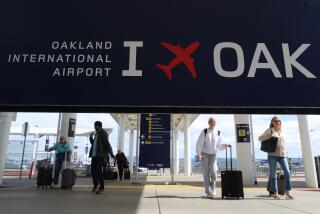S.F. Tradition : Eloquence, Wit Tested in Historic Mock Court
- Share via
SAN FRANCISCO — When is it proper to call San Francisco “Frisco?” Never, ruled the judge.
Did Mark Twain slander the city’s weather?
What about silent film star Fatty Arbuckle, acquitted on a manslaughter charge in 1921 after sometimes-model Virginia Rappe died following one of his wild parties at the St. Francis Hotel? Has history given him a fair shake? No, the judge decided.
For a decade, San Francisco judges have--with great irregularity--been holding mock trials to review how history has treated local characters and events.
To date, 35 “trials” have been convened in a real City Hall courtroom, presided over by real judges who referee arguments presented by authentic lawyers. Witnesses are sworn in, questioned and cross-examined. Attorneys argue their cases with all the wit and eloquence they can muster.
At the end of the one-hour trial, held during lunchtime to avoid conflict with the regular court calendar, the judge renders a decision.
Started as Publicity Stunt
Former newspaper reporter Bernard Averbuch, one of the inventors of the unusual hearings, recalled that what is now known as the Court of Historical Review and Appeals began in the courtroom of Judge Harry Low, as a stunt to draw attention to a new police museum in 1975.
That first trial was an informal affair aimed at clearing the name of George Wittman, fired in 1905 from his post as police chief for incompetency and neglect of duty. Low ruled that Wittman was wrongfully dismissed.
The ruling did not have the force of law, but history buffs clamored for more.
The trials have since evolved into more formal affairs, and the courtroom overflows with spectators.
“We never want for a crowd,” said Averbuch, who is an unofficial court administrator.
“We’re doing it to get attention and make people interested in history. We sometimes correct a mistake in history,” he said.
The most recent trial was called to re-examine the case of Arbuckle, a one-time Keystone Kop and $1-million-a-year silent screen superstar. Rappe’s death a few days after the St. Francis Hotel party ruined his reputation.
Died of a ‘Broken Heart’
Although he was found innocent of manslaughter, rumors persisted that Rappe had been raped with a soda bottle wielded by Arbuckle. He died nearly penniless in 1933--of a “broken heart,” one of his descendants testified.
A police detective testified that the evidence did not support the manslaughter charge, and the judge agreed, directing that a copy of the real jury’s finding be displayed at the police academy beside a mug shot of Arbuckle.
The Mark Twain case stemmed from a quotation often attributed to the 19th-Century humorist: “The longest winter I ever spent was a summer in San Francisco.”
San Francisco, proud of keeping its foggy summer cool while the rest of California sweats, had long been piqued by the remark.
After hearing from a number of witnesses, including a former Harvard professor who took the stand in a Twain-like costume, the judge ruled that the remark “probably” was not authentic Twain.
Of tourists’ penchant for calling the city “Frisco,” a judge said it was no more proper to use a nickname for San Francisco than to use one to “refer to gentle Saint Francis of Assisi.”
More to Read
Sign up for Essential California
The most important California stories and recommendations in your inbox every morning.
You may occasionally receive promotional content from the Los Angeles Times.













